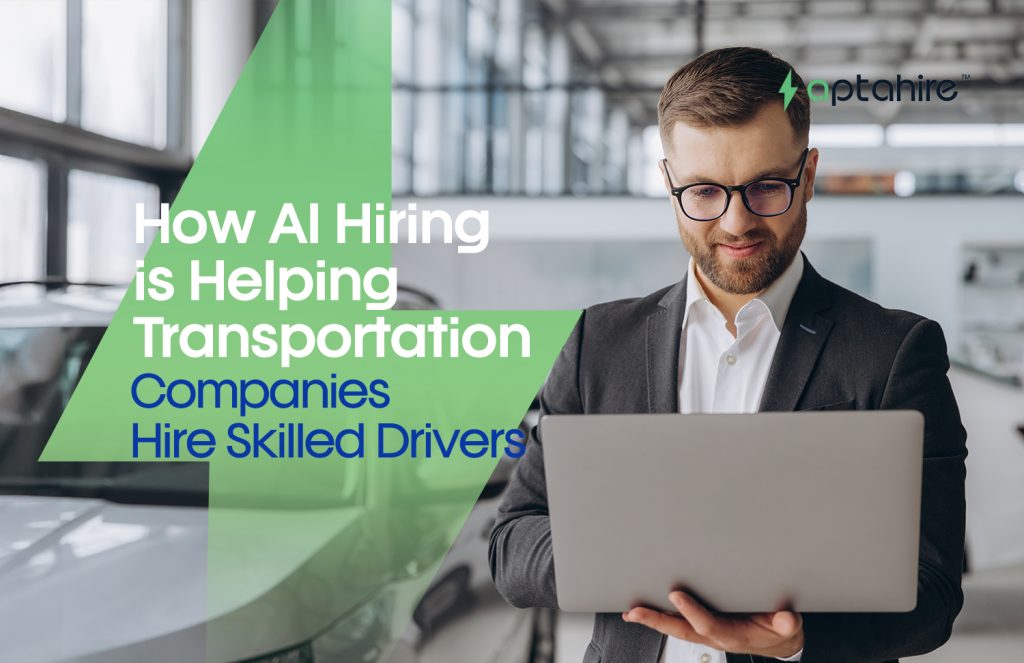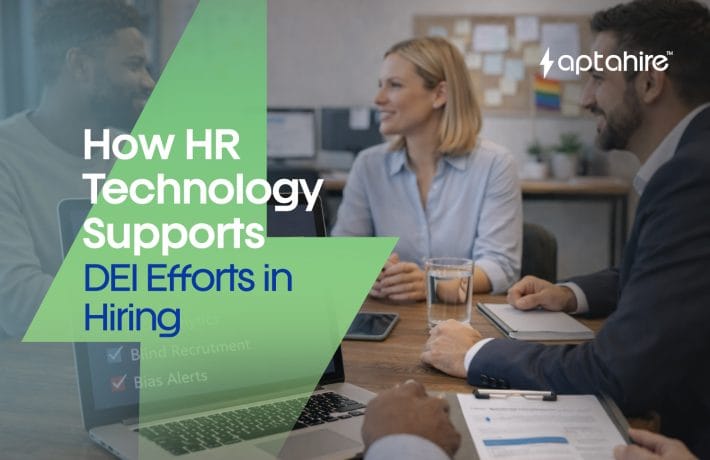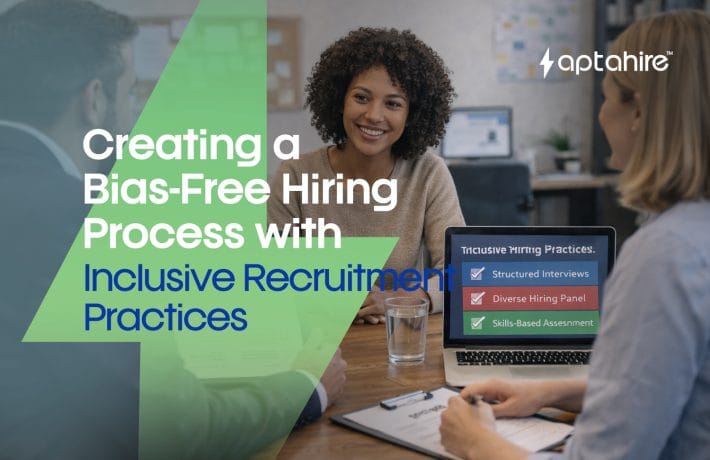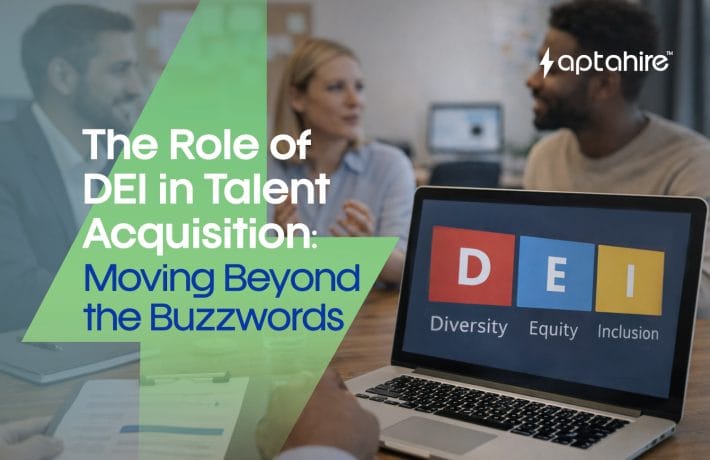How AI Hiring is Helping Transportation Companies Hire Skilled Drivers

How AI Hiring is Helping Transportation Companies Hire Skilled Drivers
Introduction
Finding skilled drivers isn’t just about holding a valid license anymore. For transportation companies, the stakes are much higher. They need professionals who are not only experienced behind the wheel but also reliable, safety-conscious, emotionally stable, and capable of adhering to tight schedules. And let’s be honests, ifting through stacks of resumes and conducting manual interviews simply isn’t cutting it anymore, especially with high turnover rates and time-sensitive demands.
Enter AI hiring, the game-changer transportation companies didn’t know they needed, but now can’t function without.
In this blog, we’ll break down how AI is reshaping the way transportation and logistics firms hire their drivers, from applicant screening to onboarding, with real-world examples, stats, and a touch of human insight.
1. The Problem: Traditional Hiring Was Broken
Before we dive into the tech, let’s understand the key hiring challenges in this space:
- High attrition: The trucking industry sees an average turnover rate of 90% annually in some regions.
- Time-consuming screening: Reviewing resumes manually often means hiring managers miss red flags or overlook great candidates.
- Lack of soft skill assessment: You can’t always tell from a resume if someone is patient in traffic, mentally alert on overnight trips, or communicative with dispatch.
- No predictive performance data: Traditional hiring methods rarely predict how a driver will actually perform on the job.
That’s where AI steps in, not to replace recruiters, but to empower them with better tools, faster insights, and smarter decisions.
2. What AI Brings to the Wheel: A Breakdown
Let’s explore the major ways AI is helping transport and logistics firms hire better drivers.
a. Smart Resume Parsing
AI-powered Applicant Tracking Systems (ATS) can instantly scan thousands of resumes, picking up on key variables like license types (CDL-A, B, etc.), years of driving experience, route familiarity, accident history, and employment gaps.
Rather than manually filtering applications, AI narrows it down to the most relevant profiles, in seconds.
Case Example: A logistics firm using HireVue’s AI-powered tool reduced time-to-hire by 45% by shortlisting only top-tier candidates based on skills, certifications, and past performance indicators.
b. Predictive Behavioral Assessments
AI doesn’t just look at your past, it tries to predict your future. Using data from assessments, driving simulators, and behavioral interviews, AI tools can forecast performance, flag risk-prone behavior, and gauge attributes like:
- Stress tolerance
- Decision-making speed
- Compliance behavior
- Attention span
- Emotional resilience
These assessments help ensure road safety before the driver even hits the road.
c. AI Video Interviews
Some tools like Aptahire, Pymetrics, or MyInterview use AI to analyze not just what a candidate says but how they say it:
- Facial micro-expressions
- Eye movement (to detect honesty or focus)
- Speech clarity and tone (important for communicating with dispatch or during deliveries)
- Reaction time to situational questions
These insights allow recruiters to understand how drivers might respond under real-world pressure.
d. Geo-Based Matching
With AI, companies can match drivers based on their location, route preferences, and home-time needs, reducing burnout and increasing retention. AI can also suggest route-based jobs that align with the candidate’s experience (long-haul, city logistics, inter-state cargo, etc.).
e. Automated Compliance Checks
Hiring drivers isn’t just about skills, it’s also about compliance with local transport laws, drug testing, background checks, and license validity. AI systems can automate these tasks, pulling data from:
- DMV databases
- Drug & alcohol testing systems
- Past employer verifications
This minimizes human error and ensures only fully compliant drivers are hired.
3. Benefits for Transportation Companies
So, what’s in it for logistics firms who embrace AI hiring?
| Benefit | Explanation |
| Faster Time-to-Hire | Cut down hiring cycles by up to 60%. |
| Better Candidate Fit | Match job roles with personality and route fit. |
| Lower Attrition Rates | Happier drivers stay longer when matched right. |
| Increased Safety | Predict and prevent risky hires. |
| Cost Savings | Fewer bad hires = less financial loss and fewer accidents. |
4. Real-World Case Study: FleetFox Logistics
FleetFox, a mid-sized logistics company in Texas, integrated an AI hiring solution in 2024. Within 6 months:
- Driver turnover dropped by 38%
- Accident-related costs decreased by 22%
- Time to fill open roles fell from 21 days to just 8 days
Their HR manager said:
“AI didn’t take away the human touch, it helped us focus our energy on the best people, instead of wasting hours on mismatched resumes.”
5. But Is It Fair? Addressing the Skepticism
A common concern: “Isn’t AI biased?”
Great question. In fact, poorly trained AI can carry human bias. That’s why reputable vendors invest heavily in:
- Transparent algorithms
- Regular audits for fairness
- DEI-focused data training
- Options to override AI decisions with human judgment
The best AI hiring platforms don’t replace humans, they augment their capabilities while maintaining fairness and compliance.
6. Future Trends: What’s Next in Driver Hiring?
Looking ahead, we’ll see:
- AI-integrated driving simulators for real-time skills testing
- Wearable tech data integration to assess health indicators like fatigue
- Voice-based AI interviews via mobile apps for remote access
- Driver mood analytics during video interviews
The goal? Not just to hire faster; but to hire safer, smarter, and with long-term fit in mind.
FAQs
1. How does AI benefit the transportation industry?
AI enhances transportation by optimizing routes, predicting vehicle maintenance, reducing fuel costs, and improving safety. It streamlines fleet management, monitors driver behavior, and helps avoid traffic delays. Overall, it boosts efficiency, lowers operational costs, and ensures smarter, data-driven decisions in logistics and transportation systems.
2. How does AI help the hiring process?
AI simplifies hiring by automating resume screening, scheduling, and candidate evaluation. It identifies top talent faster, reduces human bias, and improves candidate-job matching using predictive analytics. This leads to quicker hiring decisions, better retention, and a more efficient recruitment process for companies across industries.
3. What is the role of AI in travel and transport?
AI in travel and transport improves route planning, automates vehicle systems, predicts delays, and personalizes customer experiences. It powers traffic management, autonomous driving, and travel apps, making transportation systems smarter, safer, and more responsive to changing real-time conditions and passenger needs.
4. How to use AI to help with recruiting?
Use AI to screen resumes, assess candidate behavior through video interviews, and automate communication. AI tools can match applicants to roles, predict job success, and streamline onboarding. This makes the recruiting process faster, more accurate, and scalable, even for high-volume hiring needs.
5. How is AI expected to impact the transportation industry by 2025?
By 2025, AI will transform transportation with autonomous vehicles, predictive maintenance, and AI-driven traffic systems. It will reduce accidents, improve delivery timelines, and lower operational costs. Smart logistics and real-time tracking will become standard, boosting overall efficiency across the transportation ecosystem.
6. What is the application of AI in transportation projects?
AI is used in planning, designing, building, and managing transportation projects. It predicts traffic, optimizes routes, monitors safety, and helps with real-time decision-making. AI also improves construction efficiency and supports smart infrastructure development for future-ready transportation systems.
7. Which companies use AI for hiring?
Companies like Unilever, Amazon, DHL, Vodafone, Hilton, and Tesla use AI for hiring. They rely on AI tools for resume screening, video assessments, and candidate matching to streamline recruitment, reduce bias, and speed up the selection process, especially for high-volume or global roles.



